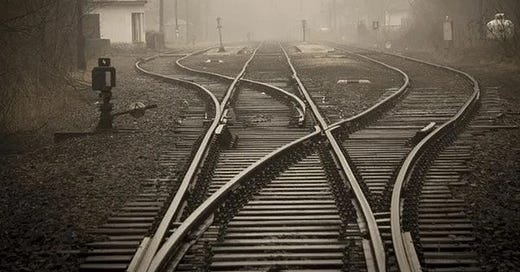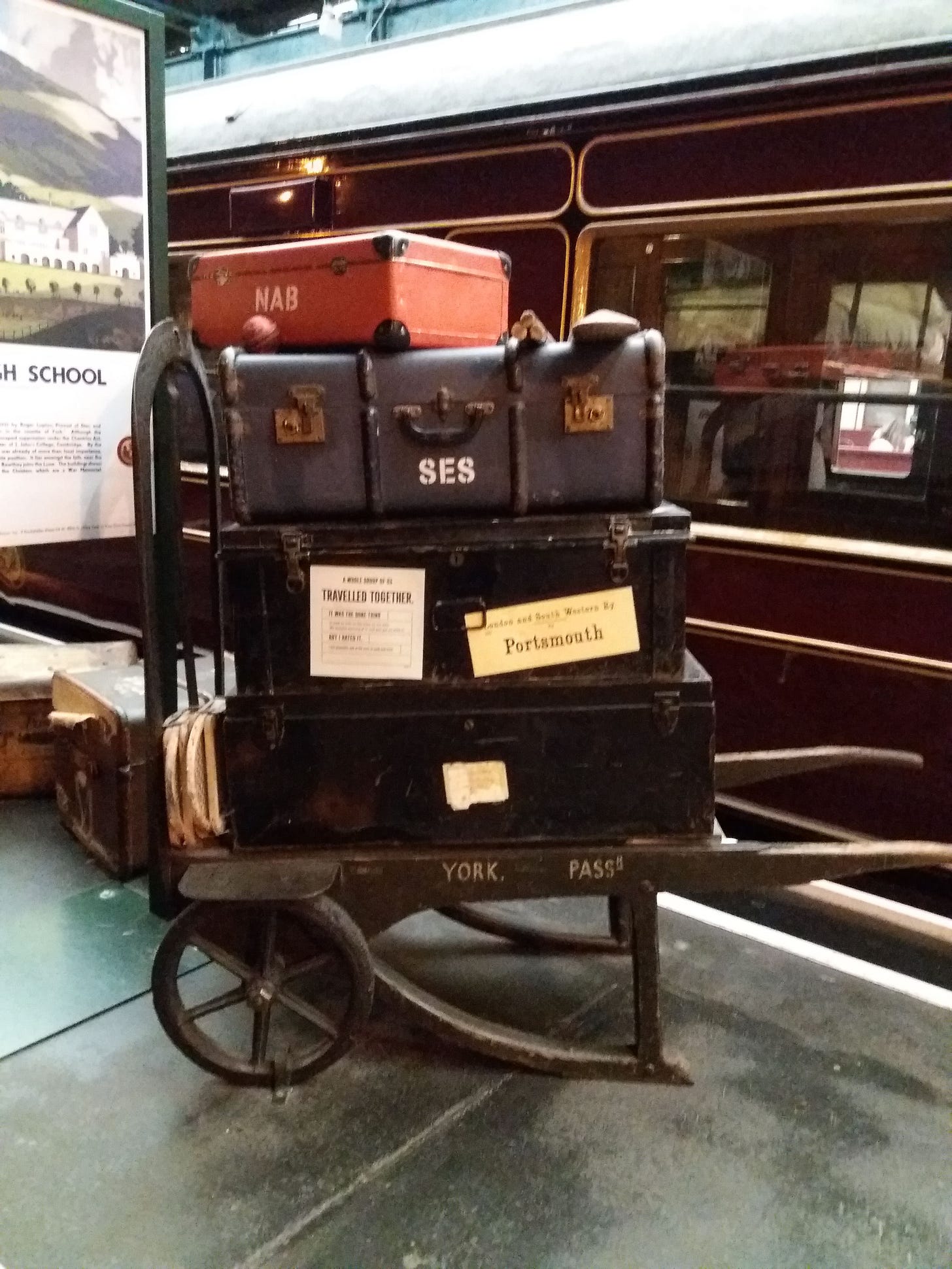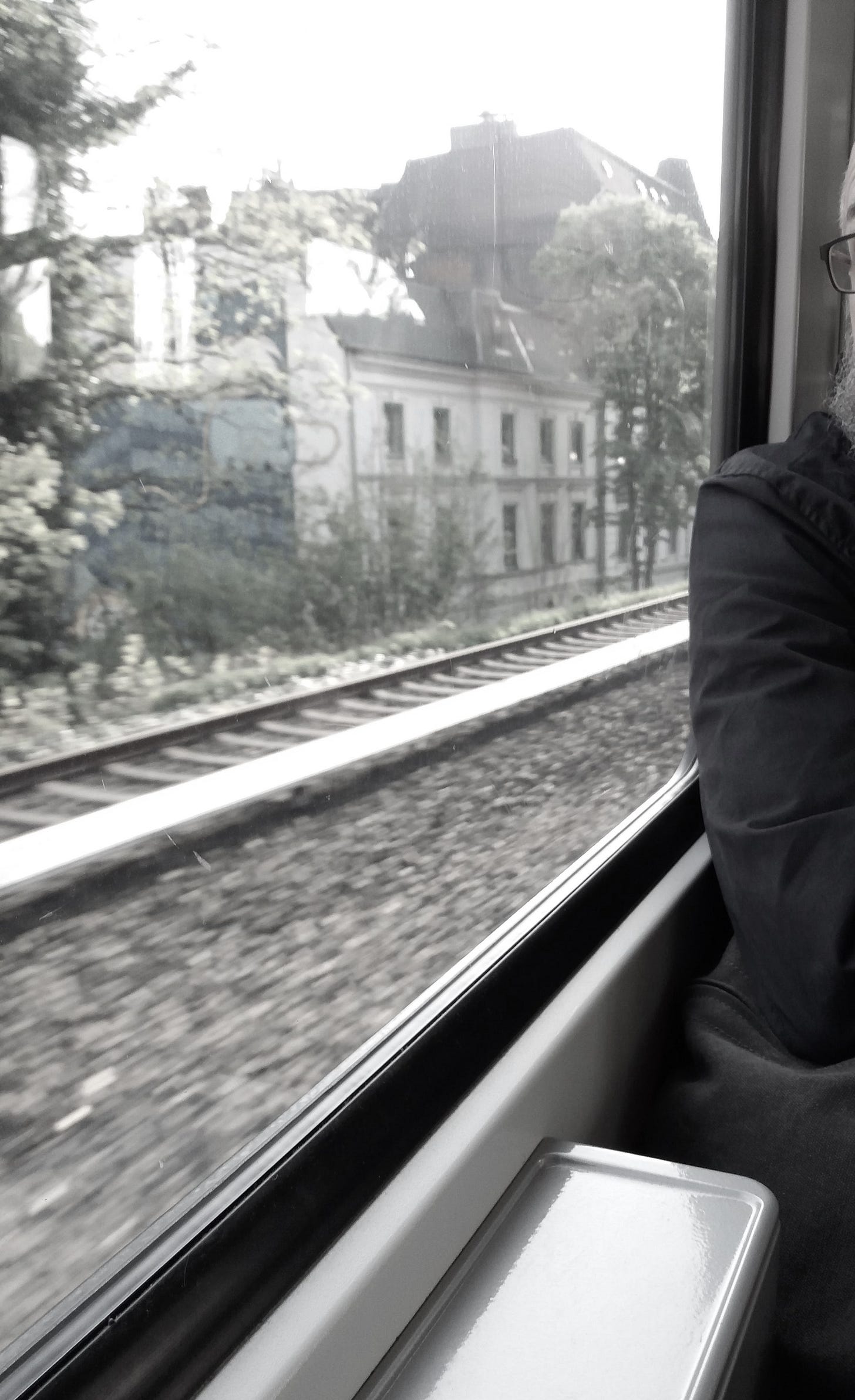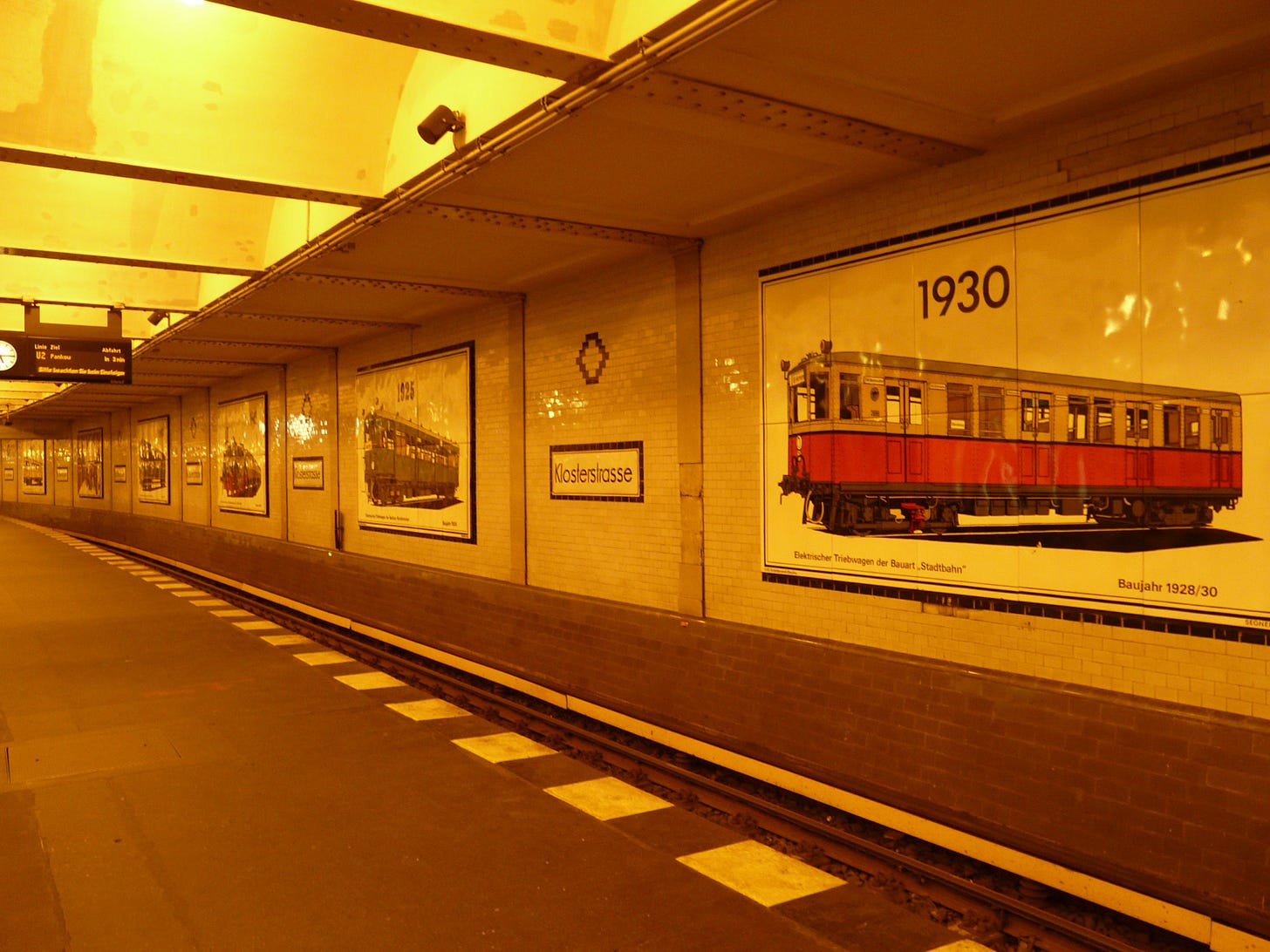This Train is Destined to Terminate.
All change. Please, all change! A consideration of the train metaphor for our times.
Neil Oliver’s recent use of a train motif to comment on current events resonated with me. He stated that the change of British prime minister,
“was little more than a change of drivers on a train. The train we’re on is going where it is scheduled and timetabled to go, on rails [that are] already laid. And in the face of its forward momentum, we the people, it would seem count for nothing.”
He continued to pour disdain upon:
“…world leaders talking more and more openly about a liberal world order, even a rules based liberal world order; the more I hear and see about a world ordered by self-described liberals and their rules the less I like it. I certainly don’t recall ever being invited to vote for it. Two years ago I gave scant thought for acronyms like UN, WHO and WEF, now I watch them with the same attention I give to dogs that look like they might bite……the technocrats took free speech by the throat long ago so as to preserve and push their own self-described progressive ideologies…”
(Neil Oliver, GB News monologue, 9th July 2022.)
Oliver’s monologues are gaining traction for their powerful poetic commentary on the rapidly regressive political landscape on view through the windows of that metaphorical train. Endlessly passing signal after signal at danger, in “railway speak” we might call it out for what it is, a SPAD for every SAD. In translation, a signal passed at danger for every sudden adult death.
Our lives are split between two single bore tunnel visions. The “up” line seeing the unfolding catastrophe and the “down,” quick to obey every grinding stupidity. As the train hurtles on down the line, platform after platform passes. It is we who cannot disembark, and are, in a manner of speaking, de-platformed. We’re not the stopping train. We’re off the rails, uncoupled from reality.
Mind the gap.
It is not that long since we read Douglas Murray’s powerful metaphor of the train that arrives at the station only to pick up steam and go crashing down the tracks and into the distance. In his introduction to The Madness of Crowds, Murray lays bare the intersectional tracks of modern sexual and racial identity, if you like, a bi-directional tunnel vision anticipating the inevitable crash. No AWS, or Automatic Warning System, here.
Like Neil Oliver’s usage, Douglas Murray’s railway metaphor struck a chord with me. I too have had a similar image float through my mind from time to time. In my version, there is no stated destination. We’re all on the train, and we are just going, and going; it might slow down, it sometimes speeds up, but it never stops. We don’t check our speed; we check our privilege. We know not when we will get to (of course!) unreachable Utopia. Utopia meaning “no place,” we are destined to keep chugging along, rat a tat tat, rat a tat tat. We must progress. It is obligatory.
The question for me remains, how will we know when we get there? What is Utopia like? What are the signs? What is the name of the station? What should I look for? How could we know? And, I hear my four-year-old self whining, “are we nearly there yet?”
We are never nearly there. And yet, as Murray alludes, we pretty much are there. We are simultaneously there and not there. Or rather, we were until what seemed like yesterday. It is on this point that I diverge from Murray’s analogy, good though I find it to be.
In my version of the train metaphor we cannot possibly get to our progressive destination. This is because there can never be a positional truce of any sort, because there can never be any agreement on truth. The side that “intersectionalises” is in it for the sake of the fight, not the solution. And so it is always about the chase towards a final solution that can never quite be grasped, and must never be reached, lest it be “game over.”
What is it about these railway metaphors?
The train is helpfully analogous for our times, as its very nature is one of progression. One moves inexorably forward on a good day, and with luck, at haste. Historically, trains are regarded as the epitome of progress. In the 19th century, their novelty, invention and usage altered perceptions of many things. Journeys had the effect of collapsing time as great distances could be traversed so quickly. The after-effects of train journeys meant that time itself had to be recorded in new ways. We required a standardisation of time across the country so that journeys could be coordinated. Trains can even be seen to have anticipated the motion picture, as people experienced the views through train windows as though watching a film. Trains changed our understanding of the landscape and gave us thrilling new metaphors and sayings. Examples include: that’s just the ticket. There is light at the end of the tunnel. He’s got a one-track-mind. Covid policy is a train wreck. And now we’re getting side-tracked.
And so, we are hurtling and hurting towards our destination.
Neil Oliver almost hints at my own dark vision. No sooner does he place us on his metaphorical train, than he brings an image of snarling, snapping dogs into play. And that gets so close to where I think we’ve been going all along. Now I dare you to think it.
To set the scene, there was, in the 1930s, another version of a “great reset” which formed a progressive drive for modernisation and revolution. In that great reset, medics lied and experimented on unwilling and unwitting innocents. In that great reset, nurses injected their patients, the handicapped, mentally ill and infirm, with what they knew to be a lethal concoction. They did so in the name of following orders. This killing, which formed a prototype for further killings, was for the sake of a new and future healthy population free from disease. In that great reset, the vision was the creation of a superior race. In that great reset, euthanasia was at the heart of a new “rational” society with the discarding of “useless feeders.” That great reset claimed to use science to improve the human race. So, people were sterilised against their will. In that great reset, the collective mattered more than the individual. It looks as though Klaus Schwab has a model that was prepared earlier for his “vision.”
According to the documentary Caring Corrupted: The Killing Nurses of The Third Reich, a greater percentage of physicians became members of the National Socialist Workers Party than that of the general population. Does that strike you as odd? A further rather prescient point is made. Physicians were no longer asked to care for patients, but to care for the state. This is a point which finds its echo in the present-day exhortation to “protect the NHS.” The state’s big idea was built upon a fear of disease and the urge for cleanliness. Children were taught in school that it costs too much to keep a disabled person. In the way that medics today are paid for each injection, midwives were then paid for each disabled baby they reported.
And so our train analogy recalls a network of tracks and wagons, freight and cattle trucks without which the then final solution could not be enacted. Timetables and schedules, organisation and rationalism. Counting and calculating. And always there is some good cause to get behind. Always there are orders to follow, not to question. Not me guv. I’m just doing my job. I have a mortgage. I don’t want to lose my pension. The encouragement to be healthy and eat a vegetarian diet was never far from the mind of one renowned leader. Oh, the irony. I cannot now conceive of Klaus Schwab’s so called Fourth Industrial Revolution without the corrective reverberation of a “Fourth Reich” rattling in my head.
In another chiming of events, German pharmaceuticals were heavily involved with the experiments conducted at concentration camps which were done, natürlich, without informed consent. People were frequently killed after being used like laboratory rats. Does anyone reading this need reminding that the very notion of informed consent derives from that monstrous time? Or, how the renowned Nuremberg trials and follow up Nuremberg code designed to ensure that this, the thing we are living through now would never happen again? Never again we said. And at the 75th anniversary of the formation of that vital Nuremberg Code, Vera Sharav gives a devasting speech demonstrating the crucial importance of that code and what lies ahead should we fail to heed her warnings. At the trials at Nuremberg, among the excuses given by nurses for their crimes were, “I thought I was relieving suffering,” and, “I needed to keep my job,” and “I was only following orders.” Does it sound familiar?
So back to our train, rattling away, the question comes again, how will we know when we get there? My nightmare is that unless we stop this train, we’ll forever see those snapping dogs, smell the burning and know that we own nothing. Not even our own bodies.
Because we have been here before.
The seemingly endless array of literature, films and television programmes have shown us. Scholarly works and books have written to us. And still we go onwards immersed in yet another cult born of narcissism and totalisation. This gateway to hell takes the form of the Russian Roulette of injections. And they will not free you. Depopulation undertaken for the sake of, let’s call it “climate change.” However, it may as well be for Lebensraum. For then, it was the Volkische Gemeinschaft, and now it is the “collective.” Sounds nice and cuddly, doesn’t it? Basically, it means you won’t matter. We can add to the list, that great concept, the undefinable notion of modernity, technological progress, social equality, social welfare and unity. However you skew it, National Socialism was not conservative but revolutionary. It was decidedly anti-capitalist, anti-free markets and above all, it was for purity and purification. And today’s couplet goes like this: vaxxed or unvaxxed? As pure and impure regardless, we continue, on we go down the tracks.
And the signals are still passed at danger.
Suddenly, my vision shows that we will, we must know the place to which we travel. We can only be going to one place on that train. Danger at signals passed….. Stand clear of your life’s closing doors. It is the place we always go to in the end. It bears that infamous name. Please mind the gap between the train and the platform edge…and those, now closing, doors…
As you arrive at those infamous, unmentionable gates. (Gates?)
Is that really such a bizarre analogy, or a tasteless one? Are we forbidden from making any comparison to the Holocaust because of its seriousness? Is it an afront to the victims to do such a thing? Very possibly. “After Auschwitz, to write poetry is barbaric,” said Theodor Adorno in 1949. Yet the subject continually beckons itself. As Robert Eaglestone has written, the Holocaust is a “horizon that orients our time.” Western society continues to respond to the Holocaust artistically and philosophically. Moreover, the Holocaust is a reference point precisely because of its continuing resonance. New films, books, articles continue to emerge. I recently watched The Auschwitz Escape (2021), a gritty and tense film. Readers will know that there is an abundance of Holocaust related material on Amazon Prime and Netflix. Whilst some of this content is ghoulishly commercial, not all of it is.
Western society continues to take the Holocaust very seriously indeed. It is never really far from our thoughts. Eaglestone draws our attention to the sober point that if we were to assemble all of the literature that explored or merely referenced the Holocaust, the amount “would consist of too large a number of works to read in a lifetime.” Moreover, there are a number of works that appear to have nothing to do with the Holocaust that do, nevertheless, reflect upon it. The extent of this he suggests, is that we could well ask what it means if a novel or poem produced in Europe or America since 1945 did not engage with the issue.
Writers explore the Holocaust’s meaningfulness and often with the specific intention of preventing another one. This, of course, is a frequent argument made for continuing to write about the subject or make art about it. The argument that we must never forget. We must find ways of engaging with people of all ages. Yet the question that comes to the fore is, what exactly is it that we are trying to prevent? And how would we know it when we see it?
The problem is that we can only draw upon images from the past. Familiar images which frequently depict and describe those dreadful train journeys, the smoke and the steam, the barking dogs, and the terrible end of the line for those on board. What we do not see so clearly is how such an event could sneak up upon us in the way that the Holocaust did then, all those years ago. I have heard the Holocaust described as a “discovered possibility” rather than a fully-fledged thought-out plan. Planned or not, it happened in plain sight. And, just like now, people knew.
In They Thought They Were Free, Milton Mayer interviews ordinary Germans who were members of the National Socialist Workers Party and learns about the incremental steps taken towards the new world order of things. One little step at a time, one little compromise at a time, until it is too late. It is chillingly familiar to read descriptions of how everything seems normal on the face of it, people are the same, the buildings are the same, life seems the same, but in a sense, absolutely everything has changed.
In March 2021, the online platform Jewish News featured a story about leaflets that had been posted in public spaces intended to warn about the predicament of lockdowns and vaccines. It cited a respondent who claimed the leaflet was “repulsive” and that it was “hijacking the Holocaust.” The leaflet in question referenced the concentration camp slogan “arbeit macht frei” and tried to make a point of irony that known eugenicists were claiming to save lives with vaccines. The dropping of leaflets is reminiscent of the White Rose students Hans and Sophie Scholl, who dropped leaflets in Germany in an attempt to warn and inform the population about the reality of the war. (It is no small coincidence that in Britain, a new White Rose group inspired by the Scholls, was formed in response to current events). Since March 2021, we have learned a great deal more about the deaths caused by the injections. It all looks so different. Much data is now available in other places (not least from Britain’s own government sources) to show that death rates have been climbing in correlation with injection rollouts and not resulting from the virus. A similar story emerges from Israel. Governments know this and deflect attention away from the calamity. They show not the slightest interest in investigating the issue. Why? If all is normal and done for the “good” why are they hiding so much?
The deaths are cleverly concealed. Many are passed off as “coincidence.” They come from a bioweapon called covid, passed off as an unfortunate natural event. For more on this see (amongst other sources) Robert Kennedy Jr.’s book The Real Anthony Fauci. They also flow from the house arrests we named in prison language, “lockdowns.” More deaths then ensued (and continue) from the spike protein producing injections, injections which have also rendered some people infertile. Additionally, the injections have further caused multiple miscarriages. Medical claims are coming thick and fast to insurance companies in countries that do not have a British system of healthcare. Thorsteinn Siglaugsson writes about that here. Birth-rates are dropping and all-cause death rates are above the average by a significant amount, in Britain, this amounts to over 1000 per week. The government shows no interest in investigating these deaths. Correspondence to the MHRA regulating authority goes unanswered. If one covid death was “one too many” why now is something in the region of 1000 excess deaths per week in Britain, regarded as unimportant? Is there really nothing to see here? (Igor’s newsletter has more detail on this matter. See also Tess Lawrie here for a discussion on fertility rates). So what lessons can be drawn from this?
Here is how I see it. To sense or recognise that we are in the middle of another Holocaust is not an insult to the dead. On the contrary, is not the whole point of our annual commemorations to remember and endeavour to prevent such an event (or events) from occurring again? It would be a far greater insult to all those who died to refuse to learn from their suffering and pretend that nothing untoward is happening. Because things are clearly not “normal.” It is the duty of every person to call out this situation for what it is. Otherwise, what is the point of all this remembering if you are silenced when having learned from your remembrances you sense a new danger to humanity?
There is much to link together. Coming up on the heels of the covid narrative, we are on the brink of unaffordable energy costs, blamed on a contrived war or a one-sided narrative on climate change; we also see a further continuance of the lack of medical treatments, we see deliberately created food shortages due to government farmland confiscation at the behest of the unelected WEF, more businesses in Britain will close due to unaffordable energy costs leading to a further spiralling of misery, unemployment and loss. We have been told many times that poverty leads to higher death rates. All of which do not seem to concern the government, nor, in Britain at least, the opposition parties. What has happened to the left’s idea of social justice or caring for the weakest in society? The silence is voluminous. Inflation is set to destroy most people’s reserves. The inertia shown by governments does make it all appear remarkably like a plan, or is that a discovered possibility?
Hannah Arendt’s The Origins of Totalitarianism and Mattias Desmet’s The Psychology of Totalitarianism are both instructive here. When people are desperate, what happens? They seek out a “saviour” figure in the form of a new leader or regime that claims to help. Be warned, if it gets to that stage, then it’s pretty much done. You are hungry? have a nice social credit system, no freedom to choose nor speak freely, answer back and risk cancellation. Shut up to eat. We can now understand, if we hadn’t already, that the powers that be are deliberately inducing chaos into all manner of things. Because this will lead to events that can be used to the justify the planned totalitarian digital technocracy where the collective presides over the individual.
If we factor in the intense level of censorship around all of this, and the reluctance to even discuss the many terrible things happening, we have a sickening sense of what life was like for the ordinary German amidst an information-controlled state, with torture, murder and the total breakdown of civilisation all around. It becomes the unmentionable situation. The subject we dare not mention socially. And on the juggernaut chugs.
Like a runaway train.
I say it is our duty to call this out, to make those dreadful comparisons. So, my friends, hard as it might be, we must continue to plough that furrow, to plant the seeds of doubt in our “normie” friends and acquaintances. To wake and to shake them and to apply the emergency braking system to them. Be Big Farmer in the face of Big Pharma. Or, in these words:
“Be like a train; go in the rain, go in the sun, go in the storm, go in the dark tunnels! Be like a train; concentrate on your road and go with no hesitation!”
― Mehmet Murat ildan
Thank you for reading this. Please do share with others if you found this interesting, and feel free to leave a comment below.
(All pictures, with the exception of the last one, by The Sideways Thinker)









Another nicely written piece 👍. I certainly agree and can see the people who are still unawares, they are being led to an untimly end by way of a multitude of adverse reactions to the potentially slow acting poison they managed to infect most of the population with.
Keep up the good work. 😉
Love Neil Oliver. A man of truth! Incredible he hasn't been fired yet!